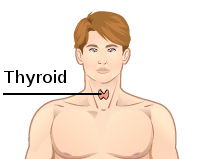The thyroid gland, though small in size, plays a monumental role in maintaining the body’s overall health and metabolic harmony. However, an overzealous thyroid, often resulting in conditions such as hyperthyroidism, can disrupt this balance and lead to a myriad of health complications. Safeguarding your health from such a situation requires a keen understanding of the thyroid’s functionalities, symptoms of overactivity, and preventive measures.
In this article, we’ll discuss the basics of thyroid gland function, common symptoms of hyperthyroidism, and precautions to take to avoid suffering from an overactive thyroid.
How the Thyroid Works
The thyroid gland is located in the neck and produces hormones that regulate metabolism, body temperature, heart rate, and other key functions. In hyperthyroidism, the thyroid goes into overdrive, releasing too much of these hormones into the bloodstream. This can cause a range of uncomfortable symptoms and can disrupt normal bodily processes.
Studies have found that hyperthyroidism is often caused by an autoimmune condition in which the body’s immune system mistakenly attacks the thyroid and causes it to become overactive. Additionally, certain medications, such as anti-depressants and lithium, can trigger hyperthyroidism in some cases.
Symptoms of Hyperthyroidism
Common symptoms of hyperthyroidism include rapid heart rate, weight loss, fatigue, muscle weakness, elevated body temperature, and feeling irritable or anxious. Other symptoms may include heavy sweating, trembling hands and fingers, difficulty sleeping, brittle hair and nails, enlarged thyroid gland (goiter), frequent bowel movements, bulging eyes (exophthalmos), vision changes, and irregular menstrual cycles.
If you experience any combination of these symptoms, it’s important to seek medical attention immediately. Your doctor can run tests to determine if you have an overactive thyroid or an underlying medical condition.
Understanding Thyroid Disorders
The most common type of overactive thyroid is Graves’ disease. This autoimmune disorder affects the production and release of hormones from the thyroid gland, causing a range of uncomfortable symptoms. Treatment for Graves’ disease typically involves medications to reduce the activity of the thyroid gland, radioactive iodine therapy, or surgery to remove part or all of the gland.
Other thyroid disorders, such as Hashimoto’s disease or hyperthyroidism due to nodules (lumps) on the thyroid gland, may also cause an overactive thyroid. Treatment for these conditions can vary and should be tailored to the individual patient.
Preventing an Overzealous Thyroid
Although there’s no surefire way to prevent an overactive thyroid, there are several steps you can take to reduce your risk. Eating a nutritious diet with plenty of fruits and vegetables, exercising regularly, avoiding certain medications and supplements, managing stress levels, and getting enough sleep are all important for maintaining healthy thyroid function. Additionally, it’s important to be aware of your family history and be mindful of any symptoms that may suggest an overactive thyroid. Early detection is key in preventing health complications from an overzealous thyroid gland.
Taking the steps necessary to ensure a healthy lifestyle can help reduce the risks associated with hyperthyroidism and allow you to maintain your overall well-being. With the right knowledge and proper preventative measures, you can safeguard your health from an overzealous thyroid gland.
The Impact of Thyroid Disorders on Overall Health
Hyperthyroidism can have serious consequences on overall health. For example, it can lead to an increased risk of developing heart problems, such as arrhythmias and atrial fibrillation, due to the elevated hormone levels in the blood. Hyperthyroidism also increases the risk of osteoporosis since hormones released by the thyroid affect bone formation and density. Additionally, pregnant women suffering from hyperthyroidism may experience premature delivery or low birth weight babies.
It’s important to be aware of the potential impacts an overactive thyroid can have on overall health to take appropriate preventive measures and seek treatment if necessary.
Conclusion
The thyroid gland is a powerful agent that helps maintain the body’s hormone balance and general health. An overactive thyroid, however, can cause a range of uncomfortable symptoms and lead to serious health complications. By understanding the basics of how the thyroid operates, recognizing common symptoms of hyperthyroidism, and taking preventative measures such as eating a healthy diet and getting enough rest, you can safeguard your health from an overzealous thyroid. Early detection and treatment is the best way to reduce the risks associated with this condition and maintain your overall well-being.

